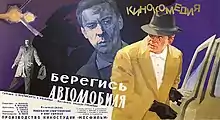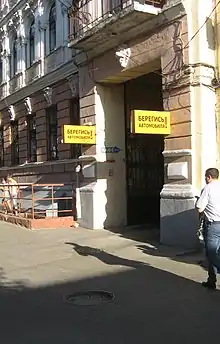| Beware of the Car | |
|---|---|
 Soviet billboard theatrical poster of the film | |
| Directed by | Eldar Ryazanov |
| Written by | Emil Braginsky Eldar Ryazanov |
| Starring | Innokenty Smoktunovsky Oleg Yefremov Andrei Mironov Anatoli Papanov |
| Narrated by | Yury Yakovlev |
| Cinematography | Anatoly Mukasei Vladimir Nakhabtsev |
| Music by | Andrey Petrov |
Production company | |
Release date | 1966 |
Running time | 94 min. |
| Country | Soviet Union |
| Language | Russian |
Beware of the Car (Russian: Береги́сь автомоби́ля, translit. Beregis Avtomobilya, English titles Uncommon Thief, or Watch out for the Automobile) is a 1966 Soviet crime comedy drama film directed by Eldar Ryazanov,[1] based on a screenplay by Emil Braginsky and produced by Mosfilm. It stars Innokenty Smoktunovsky, Oleg Yefremov, Andrei Mironov and Anatoli Papanov, among others. Beware of the Car is recognized as a satire of the film noir genre, highly unusual in Brezhnev-era society. It is credited for launching Soviet political satire as a film genre, typified by Ryazanov's work.
Plot
Yuri Detochkin (Smoktunovsky) is a humble Soviet insurance agent who steals fancy cars from corrupt Soviet officials and scammers, disappointed by the militsiya being unable to fight the crooks. One of Detochkin's victims is Dima Semitsvetov (Mironov), a retail embezzler mocked but tolerated by his colorful father-in-law Semyon Vasilyevich (Papanov), a retired Soviet Army officer. Dima has a dacha (registered to his father-in-law) and a Volga car (registered in his wife's name). Meanwhile, Yuri is a commitmentphobe who has been courting his bus-driver girlfriend for years without settling down with her. In his spare time, Yuri is an amateur actor, and in his latest play, a production of Hamlet, he is playing alongside his friend, Detective Maksim Podberyozovikov (Yefremov). Not knowing who the car thief is, Detective Podberyozovikov investigates the missing cars. When he realises who is stealing them and why, the detective faces a serious moral problem, as he discovers that Detochkin has sold the cars and anonymously transferred the proceeds to the accounts of various orphanages.
Cast
- Innokenty Smoktunovsky as Yuri Detochkin[1]
- Oleg Yefremov as Maksim Podberyozovikov
- Lyubov Dobrzhanskaya as Detochkin's mother
- Olga Aroseva as Lyuba
- Andrei Mironov as Dima Semitsvetov
- Anatoli Papanov as Semyon Vasilyevich
- Tatyana Gavrilova as Inna
- Georgiy Zhzhonov as a Militsiya officer
- Yevgeny Yevstigneyev as an acting coach
- Donatas Banionis as a priest
- Lyubov Sokolova as a judge
- Vyacheslav Nevinny as a car mechanic
- Gotlib Roninson as Yakov Mikhailovich
- Galina Volchek as a customer
- Sergey Kulagin as Philippe Cartuzov
- Yakov Lents as a tobacconist salesman
- Nikolay Parfyonov as a prosecutor
- Viktoria Radunskaya as Tanya
- Boris Runge as a man with suitcases
The author's narration was read by Yury Yakovlev.
Production
The film's name is derived from traffic signs warning of locations where cars could potentially hit pedestrians or motorists, such as parking garages.

In the film, Detochkin and Podberezovikov act together in an amateur theatre which rehearses Hamlet – a play from Smoktunovsky's real-life acting career: he was reputed as the "best Hamlet on the Soviet stage" and starred in a celebrated film adaptation.[1]
The waltz[2] performed in the film is a distinguished melody composed by Andrey Petrov. Sergey Nikitin's repertoire includes a song named Glass Gentleman (lyrics by Yevgeny Yevtushenko), which used a waltz from the film.
All of the cars stolen by Detochkin are the GAZ-21 Volga model, the most prestigious Soviet car of the time. The GAZ-21 was the standard personal car for the Soviet elite, a satire element of the film which Ryazanov found very hard to get approved.
One scene featuring a petrol station includes American vehicles such as a 1955 Buick and a 1955 Oldsmobile. These were an extremely rare sighting for the location, since the United States had sanctions on the USSR and did not sell these cars within the Eastern Bloc. According to many modern psychologists, Yuri Detochkin has Asperger's syndrome. For example, in his behavior there are elements of stimming, and an obsession with justice, and various talents (the talent of a burglar, a driver, an actor, and a private detective). At the same time, clumsiness and asociality, as well as altruism.
Awards
The film was the leader of Soviet film distribution for 1966, viewed by 29 million people.[3] Innokenty Smoktunovsky was recognized as the Best Actor of 1966.
The film won awards at the 1966 Edinburgh International Film Festival, 1966 Sydney Film Festival, 1967 Melbourne International Film Festival, and 1969 Cartagena Film Festival.
See also
- Gone in 60 Seconds (1974 film), an American film that also focuses on an insurance agent who is secretly a car thief
- Gone in 60 Seconds (2000 film), a loose remake of the 1974 film with different characters, including a detective who pursues the main character, whom he knows personally